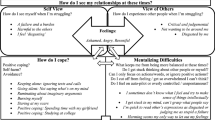Abstract
There is evidence that the losing behavior of pathological gamblers may be purposeful. In this paper, I argue that they may lose in order to fulfill a loser script. The script is a decision, or series of decisions, made early in life to accommodate to parents perceived as threatening and omnipotent. The decision, once made, is carried, unwittingly, into later life and is re-enacted repeatedly. The pathological gambler may lose to fulfill parental expectations that he or she has decided to adopt as his or her own. Because the loser script is a decision, or series of decisions, it can be redecided. This is best done with the help of a potent therapist, who is perceived as stronger than the original threatening parents, and in group therapy, wherein group members support one another in the redecision process.
Similar content being viewed by others
References
Bergler, E. (1958).The psychology of gambling. London: Bernard Hanison, Ltd.
Berne, E. (1972).What do you say after you say hello] New York: Grove Press.
Custer, R. (1980, October). Lecture at Rochester, N.Y., Chapter of Gambler's Anonymous, Rochester, N.Y.
Custer, R.L. (1982). An overview of compulsion gambling. In Carone, Yolles, Kieffer & Krinsky, (Eds.),Addictive disorders update New York: Human Sciences Press.
Custer, R., Custer, L. (1978).Characteristics of recovering compulsive gamblers. A survey of 150 members of Gambler's Anonymous, paper presented at Fourth Annual Conference on Gambling, Reno, Nevada.
Freud, S. (1959). Dostoevsky and parricide. In James StracheyCollected papers, Vol. 5, (Ed.), New York: Basic Books.
Gamblers Anonymous Third Edition (undated). Los Angeles: GA Publishing, Inc.
Goulding, M.M., & Goulding, R.L. (1979).Changing lives through re-decision therapy. New York: Brunner/Mazel.
Laing, R.D. (1972).The politics of the family and other essays. New York: Vintage Books.
Livingston, J. (1974).Compulsive gamblers: Observations on action and abstinence. New York: Harper & Row.
P., Bernie. (1973).Compulsive gambler. Secaucus, N.J.: Lyle Stuart, Inc.
Shubin, S. (1977, April). The compulsive gambler.Abott Laboratories Today in Psychiatry, 3(4).
Stiener, C. (1971).Games alcoholics play. New York: Ballantine Books.
Author information
Authors and Affiliations
Rights and permissions
About this article
Cite this article
Ingram, R. Transactional script theory applied to the pathological gambler. J Gambling Stud 1, 89–96 (1985). https://doi.org/10.1007/BF01019861
Issue Date:
DOI: https://doi.org/10.1007/BF01019861




